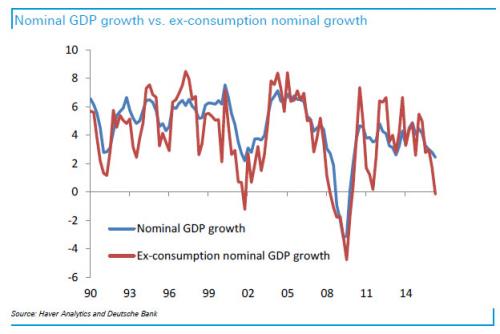The only reason the U.S. economy isn't crashing
Consumers may be the only thing stopping the U.S. economy from slipping back into recession.
Perhaps the only bright spot in the latest gross domestic product data, which showed that the economy grew at much weaker than expected 1.2 percent annualized rate between April and June, is that Americans kept spending. Negatives included a decline in inventories and a drop in housing and business investment.
Indeed, the U.S. is on pace to grow at its weakest rate since 2010.
Worse, everything unrelated to consumer spending is suffering an outright contraction for the first time since the recession ended in 2009, according to Deutsche Bank. That means the tailwinds encouraging shoppers to hold the economy aloft at the moment, including steady job gains and evidence of nascent wage inflation, could be vulnerable to a downside reversal in the months to come.
Digging into the numbers, Deutsche Bank economist Joseph LaVorgna highlights two big drags.
The first is business spending. Expenditures on new equipment fell 3.5 percent in the second quarter and is down nearly 2 percent over the last year. Spending on structures was down 7.9 percent in the quarter and 7 percent over the past year.
It's no wonder labor productivity is stalling. Businesses, nervous about what the future holds and more willing to use cash to boost earnings per share via buybacks, are withholding the spending necessary to help workers be more efficient. This will damage the economy's long-term growth rate, something economists are increasingly worried about.
The second drag on growth is housing, with residential investment dropped 6.1 percent last quarter.
The economy would've done much worse if not for consumers, who for now appear to be maintaining their morale. Inflation-adjusted spending increased 4.2 percent in the second quarter, well above the 2.7 percent average over the last four quarters.
The big question is whether consumers, who account for roughly two-thirds of economic activity, can keep the nation's cash registers cooking. Economists fear that, unless Americans have suddenly decided to spend their gasoline savings, the spending surge may not be sustainable.
Deutsche Bank expects a "sharp pullback" in spending this quarter as hinted by recent softness in motor vehicle sales and very cautious comments on the health of the U.S. market by Ford (F) last week.
This is worrisome compared to a similar-looking slowdown in 2012, with the business cycle now more mature and looking vulnerable. The Federal Reserve also has already exhausted much of its policy ammunition, meaning that even a rate cut might not do much to spur growth.
For their part, U.S. businesses are merely responding to an ongoing recession in corporate earnings growth, which is in its fifth consecutive quarter driven by headwinds including a stronger U.S. dollar, weak commodity prices and global uncertainty.
The latest estimates from FactSet suggest S&P 500 earnings will decline on a year-over-year basis in the third quarter as well, which would mark the six straight quarter of declining profits. With sales falling, executives are doing what they can to protect margins by slashing spending and cutting inventories.
The danger is that the ongoing swoon in corporate profits will depress hiring, which would throw ice water all over the warm, fuzzy feelings consumers are enjoying. We'll know more when the July jobs report is released on Friday. Analysts are looking for payrolls to grow 185,000, versus an unexpectedly robust 287,000 gain in June, and the unemployment rate to fall to 4.8 percent.
